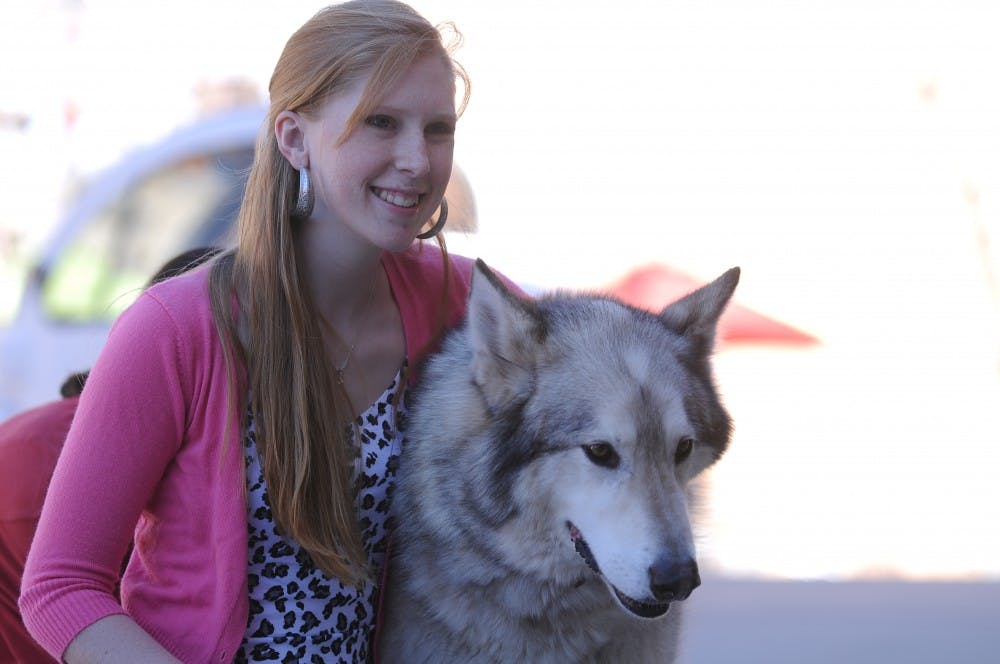Real, live lobos came to campus last week to raise awareness about efforts to reintroduce the endangered wolf species into the New Mexican wilderness.
UNM Wilderness Alliance (UNMWA) and the Biology Undergraduate Society (BUGS) hosted Wolf Fest at Smith Plaza Friday, in an effort inform faculty about the predicament faced by Mexican gray wolf.
The event featured live wolves for preservation efforts, president of UNMWA Kevin McCormick said.
McCormick said while the Mexican gray wolf has made a return from extinction in the state, only 58 wolves currently survive in New Mexico.
UNM Wilderness Alliance has been unable to meet its goal of increasing Mexican gray wolf populations as much as they had hoped. The Alliance said it originally planned to have the population at 200 by 2010. McCormick said part of the problem lies with funding. UNMWA only receives federal funding, not funding from the state.
Before the Mexican Gray Wolf Recovery Program was introduced in 1982, wolves were extinct in New Mexico. McCormick said the entire species was brought back from seven wolves found in Mexico, as well as three captive breeding populations.
McCormick said some politicians argued against the wolves’ reintroduction into the wild, claiming the animals were threatening ranching efforts and were a danger to humans.
Rep. Steve Pearce (R-NM) cosponsored House Bill 509 this year, which would eliminate the gray wolf from the Endangered Species Act of 1973.
Pearce and other sponsors have said the overregulation and protection of endangered species often overlooks or undermines economic interests, including ranching and oil production. The bill is currently under review by the House Committee on Natural Resources.
At a rally opposing the listing of the dunes sagebrush lizard on the endangered species list, Pearce condemned the U.S. Fish and Wildlife Service for failing to take into account the economic impact regulations on protected species create.
“Fish and Wildlife is making economic claims without facts,” said Pearce, according to his website. “My office has asked for data from Fish and Wildlife on how jobs will be impacted, and they claim they don’t have the information. Oil and gas jobs in southeast New Mexico are at risk. Irresponsible, unbalanced overregulation limits the amount of energy produced, which kills jobs, causes severe budget problems in the state, and increases costs to citizens. In this time of high unemployment, we can, and must, do better.”
But McCormick said wolves benefit the environment by maintaining the balance between predators and prey.
Get content from The Daily Lobo delivered to your inbox
“As America moved west, they removed all the large predators so they could put out cattle. And once we realized how bad that was for the ecosystem, it was already starting to fall apart,” McCormick said. “The ecosystem needs these apex predators because they balance everything out.”
According to the Yellowstone National Park website, the park saw an explosion of elk populations that damaged foliage in the park when workers removed wolves from its wildlife population.
Live wolves were featured during Wolf Fest in an effort to demonstrate how the animals don’t react violently to humans.
George Stapleton, the general manager for Wild Spirit Wolf Sanctuary, is the primary handler of Forrest, one of the wolves brought to Wolf Fest.
“I get to speak for Forrest, and if it makes a difference to even one person, then that’s all that really matters,” Stapleton said.
McCormick said those who want to get involved in the wolf reintroduction effort should write editors of local news papers and magazines and attend events such as Wolf Fest.
“Attend some political events so that people can see for themselves that there are students who are for the reintroduction of the wolves,” he said.
McCormick said he hopes Wolf Fest will become an annual event, and said he expected more students and community members to attend next year.
“The wolves that are out in the wild are doing well, it’s just that there aren’t enough,” McCormick said. “And that’s what we need to change.”






